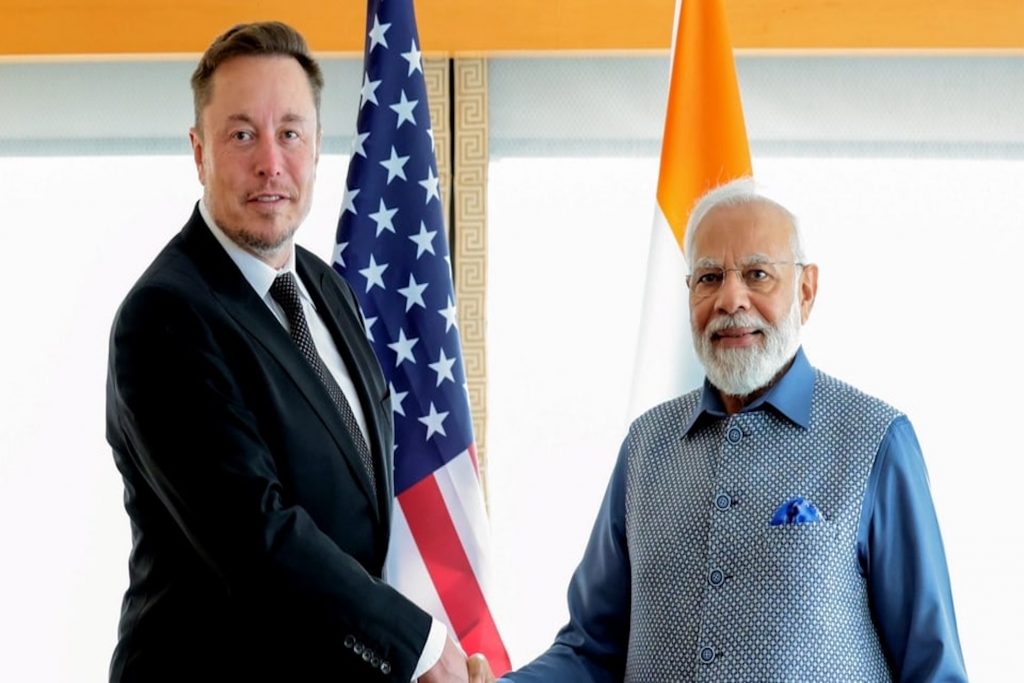Tesla chief executive Elon Musk and Prime Minister Narendra Modi discussed the car maker making a “significant investment” in the country, Reuters reported. Musk said that India has strong potential for a sustainable energy future including solar power, stationary battery packs and electric vehicles. He also said that he’s confident that Tesla will be in India “as soon as humanly possible”. His comments came after a meeting during the PM’s visit to the United States. Later, India’s foreign ministry spokesperson tweeted saying Modi had invited Musk to “explore opportunities in India for investments in electric mobility and the rapidly expanding commercial space sector.”
Punjab announces ₹300-crore incentive to promote use of electric vehicles
In order to boost EV adoption and to reduce pollution, the Punjab government will provide incentives worth around ₹ 300 crore in the next three years, the Economic Times reported. These incentives will be given on electric two-wheelers, e-cycles, e-rickshaws, e-autos and electric light commercial vehicles.
According to the report, Punjab’s transport minister Laljit Singh Bhullar has directed the finance department to create a dedicated EV fund to facilitate initiatives for the adoption of the EVs in the state, along with asking Punjab State Power Corporation Ltd and Punjab Energy Development Agency to report regarding the setting up of electric vehicle charging stations and identify suitable sites. The Housing and Urban Department has also been instructed to formulate a policy for making provision of EV charging facilities in upcoming malls and housing societies. And the state transport department has been asked to expedite the process of scrapping government buses older than 15 years and replacing them with electric buses.
FAME-II woes: Industry body writes to Minister of Commerce and Industry, seeks support
The industry body Society of Manufacturers of Electric Vehicles (SMEV) wrote to Minister of Commerce and Industry Piyush Goyal requesting “contingency support” for the EV business, which has been severely impacted by problems with the FAME-II scheme. The SMEV said that the industry is in trouble and is on the verge of collapse due to various problems and an outstanding FAME-II subsidy of about ₹1,200 Cr. It’s important to note that the government withheld the subsidy after discovering that many of the OEMs were breaking the scheme norms. While the FAME-II scheme’s problems have recently had an impact on the sales of two-wheeler EV manufacturers, the government’s recent reduction in FAME-II subsidies and the following increases in vehicle costs by some manufacturers are anticipated to have a negative impact on their vehicle registrations.
Ola’s 100GH gigafactory underway in Tamil Nadu
The construction of Ola’s 100 GWh gigafactory has started at its manufacturing facility in Tamil Nadu. A gigafactory is a manufacturing facility where products for electrification and decarbonization technologies are made.A memorandum of understanding (MOU) between the firm and the state government was signed earlier this year, committing investments of ₹ 7,614 crore for the production of lithium cell gigafactories, electric vehicles, and two-wheelers in the state. The facility is anticipated to start up early next year with a 5 GWh (Giga Watt hours) initial capacity.
Ola has made investments in both cell and battery research and development, along with establishing one of the most cutting-edge cell R&D facilities in Bengaluru. In accordance with the terms of the MoU, the business would establish an EV Hub in the state, a single location that would house advanced cell and electric vehicle production facilities, vendor and supplier parks, and a wider ecosystem for electric vehicles.
Rising EV business can push China to be the world’s largest car exporter, overtaking Japan
Multiple reports are pointing towards a likely Chinese domination in the car export market due to EVs. According to research firm Canalys, rising shipments from electric vehicles will help China overtake Japan as the world’s largest car exporter in 2023. The China Association of Automobile Manufacturers (CAAM) also reported that exports of electric vehicles from China are anticipated to reach 1.3 million in 2023, nearly double the 6,79,000 EVs exported in 2022. Total Chinese vehicle exports are predicted to hit 4.4 million in 2023, up from 3.1 million in 2022 while a recent paper Morgan Stanley put Japan’s 2022 car exports at 3.8 million. Canalys says Southeast Asia, Europe, Africa, India and Latin America are the key markets that mainland Chinese carmakers are targeting. EV exports make up for about 30% of China’s total exports, which will soon make the country the world’s largest car exporter, replacing Japan, after overtaking second placed Germany in 2022.
Hyundai to increase EV investment to $28 bn, cut back operations in China
According to Reuters, Hyundai Motor will spend $28 billion, or nearly two-thirds more than the average annual investment, on electrification over the following ten years. To increase sales of electric vehicles (EVs), the company will also restructure its underperforming China operation. The South Korean automaker has raised its EV sales target by 2030 to 2 million units from 1.87 million. It would represent around one third of its total vehicle sales, up from 8% expected this year. Hyundai also said that it plans to introduce competitive lithium-iron-phosphate (LFP) batteries, a cheaper alternative to lithium ion batteries, for the first time around 2025. However, after selling one plant in China in 2021, the business is looking to sell two more, one of which shut down last year and another it plans to close down this year.
About The Author
You may also like
Battery recycling: The missing link in India’s EV supply chain?
New report shows ways to build an efficient e-bus ecosystem in India
Corporate watchdog accuses Toyota of misleading marketing, greenwashing
Electrifying India’s Roads: Financing EVs – Challenges, Progress and the Road Ahead
Five lithium and cobalt mines identified in overseas exploration


